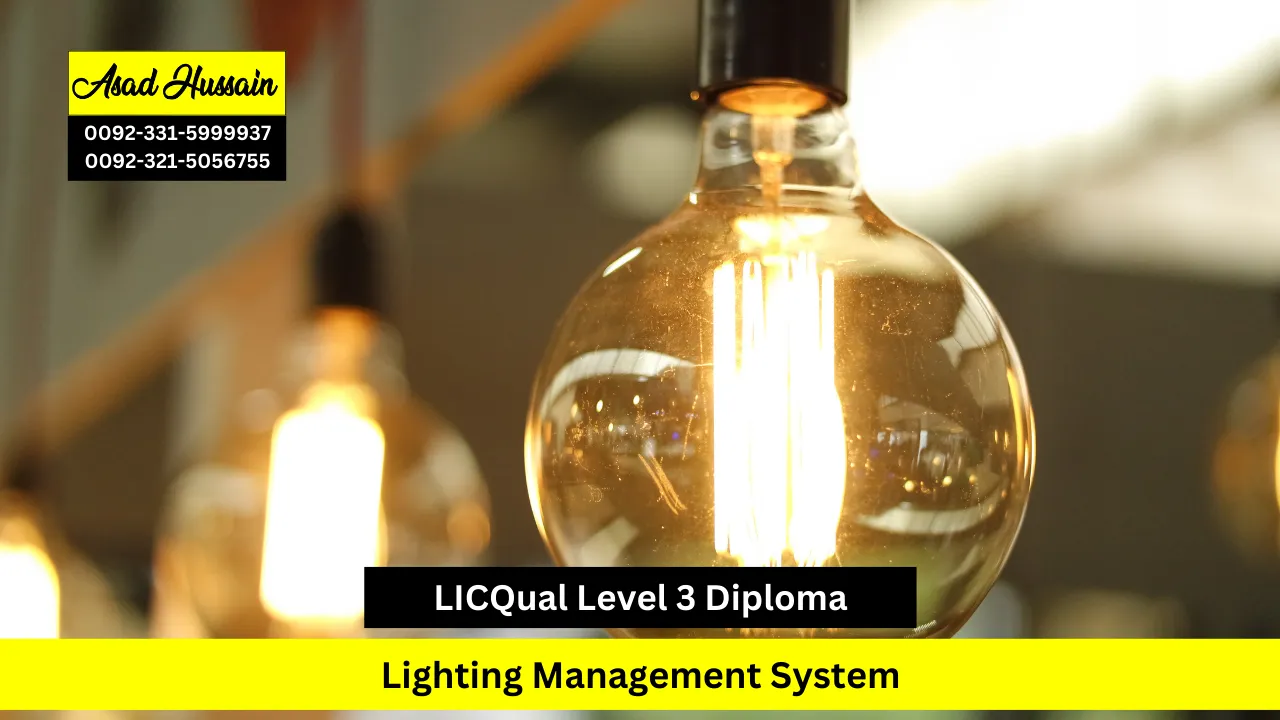In today’s modern world, the demand for energy-efficient, intelligent, and sustainable lighting systems has never been greater. The LICQual Level 3 Diploma in Lighting Management System is designed to equip learners with the essential knowledge and practical skills required to design, operate, and maintain advanced lighting control systems across commercial, industrial, and residential settings.
LICQual Level 3 Diploma in Lighting Management System introduces learners to the principles of lighting management, energy efficiency, automation technologies, and system integration. By combining theoretical learning with hands-on applications, learners gain the ability to manage lighting systems effectively, ensuring both operational performance and compliance with sustainability standards.
Throughout the course, learners will explore areas such as lighting system design, automated control mechanisms, smart building integration, and troubleshooting techniques. The LICQual Level 3 Diploma in Lighting Management System also emphasizes the role of lighting management in energy conservation and environmental responsibility, preparing learners to contribute to the global shift toward greener technologies.
Upon completion, graduates will be well-prepared to pursue careers in facility management, building automation, electrical engineering, and sustainable energy sectors. The LICQual Level 3 Diploma in Lighting Management System not only enhances employability but also provides a solid foundation for progression into higher-level qualifications within building technologies, environmental management, and smart infrastructure systems.
Program Highlights
Mandatory Units
- Fundamentals of Lighting Design
- Advanced Lighting Technologies
- Energy Efficiency and Sustainability in Lighting
- Lighting Control Systems and Automation
- Project Management for Lighting Installations
- Practical Applications and Case Studies
To ensure learners are prepared for the academic and practical demands of this program, specific entry requirements have been outlined. These requirements help learners build on the right foundation to successfully complete the diploma and apply their knowledge effectively in professional contexts.
Age Requirements
- Learners must typically be 16 years of age or older at the time of enrollment.
- Some training centers may recommend a minimum age of 18 years to match workplace safety and technical requirements.
Educational Requirements
- A secondary school qualification (or equivalent) is generally required to enroll in this diploma.
- Learners with basic knowledge of science, mathematics, or electrical concepts will find the course especially beneficial.
Professional Experience
- No prior professional experience is mandatory, making the course accessible to beginners.
- However, individuals with experience in electrical systems, building maintenance, or facility management may progress more quickly.
English Language Proficiency
- Learners must demonstrate a basic to intermediate level of English proficiency, as the course involves technical terminology, written assignments, and assessments.
- Non-native speakers may be required to provide evidence of English proficiency through recognized tests or prior qualifications.
To conclude, these entry requirements are designed to ensure that all participants are fully equipped to benefit from the course, gain practical skills in lighting system management, and pursue rewarding career opportunities in the growing field of sustainable and intelligent building technologies.
The LICQual Level 3 Diploma in Lighting Management System is designed to build both technical expertise and practical problem-solving skills. Upon completing this program, learners will be able to apply lighting principles, advanced technologies, and sustainable practices in professional settings. The following unit-wise learning outcomes reflect knowledge, skills, and real-world applications, ensuring learners are prepared for global industry standards.
Fundamentals of Lighting Design
- Explain the key principles of illumination, color temperature, and light distribution.
- Apply lighting design concepts to create functional and aesthetically pleasing environments.
- Assess lighting needs for residential, commercial, and industrial spaces.
- Demonstrate knowledge of basic electrical and safety considerations in lighting systems.
Advanced Lighting Technologies
- Identify and compare modern lighting technologies, including LED, OLED, and smart lighting systems.
- Evaluate the advantages and limitations of emerging lighting technologies in various applications.
- Integrate digital lighting solutions into building management systems.
- Demonstrate the ability to select appropriate technologies based on energy efficiency and design requirements.
Energy Efficiency and Sustainability in Lighting
- Assess the impact of lighting systems on energy consumption and carbon footprint.
- Apply strategies to reduce energy use through sustainable lighting practices.
- Demonstrate compliance with global standards for sustainable lighting design.
- Evaluate the role of lighting in supporting environmental goals and green building certifications.
Lighting Control Systems and Automation
- Explain the principles of automated lighting systems, including occupancy sensors and daylight harvesting.
- Configure basic lighting control systems for optimal performance.
- Integrate lighting automation into smart building frameworks.
- Troubleshoot and resolve common issues in automated lighting systems.
Project Management for Lighting Installations
- Apply project planning techniques for lighting installation projects.
- Demonstrate effective resource allocation, scheduling, and budgeting skills.
- Ensure compliance with safety standards and local building regulations.
- Evaluate project outcomes to identify areas for improvement in future installations.
Practical Applications and Case Studies
- Analyze real-world case studies of lighting projects to identify best practices.
- Demonstrate problem-solving skills in designing and implementing lighting solutions.
- Apply theoretical knowledge to practical scenarios in various industries.
- Reflect on lessons learned to continuously improve professional practice in lighting management.
In conclusion, the learning outcomes of this diploma ensure that graduates not only gain a solid theoretical foundation but also develop practical skills in lighting management, sustainability, and automation. This prepares them to succeed in diverse industries such as construction, smart building systems, and sustainable energy management.
The LICQual Level 3 Diploma in Lighting Management System is designed for individuals who wish to expand their knowledge and develop practical expertise in the growing field of smart and sustainable lighting. This program is ideal for a diverse group of learners who aspire to contribute to both professional and environmental goals.
Educational Instructors and Trainers
- Professionals in technical and vocational education who want to enhance their subject expertise.
- Trainers aiming to teach students or employees about lighting design, sustainability, and control systems.
Environmental Advocates and Activists
- Individuals promoting sustainability who wish to specialize in energy-efficient lighting solutions.
- Advocates seeking practical knowledge to support eco-friendly building initiatives.
Students and Recent Graduates
- Learners from science, engineering, or technical fields aiming to build specialized knowledge in lighting management.
- Graduates looking to strengthen their employability in the construction, energy, or facility management sectors.
Career Changers
- Professionals from unrelated industries seeking to transition into smart building and lighting management roles.
- Individuals eager to develop technical expertise in a field with high growth potential.
Policy Makers and Regulators
- Officials and regulators responsible for setting building codes and energy standards.
- Policy professionals looking to understand lighting technologies to create sustainable regulations.
This diploma is well-suited for both newcomers and experienced professionals who are committed to advancing their careers in lighting management, energy efficiency, and sustainable technologies. It provides learners with the skills, confidence, and industry recognition needed to excel in this growing field.







